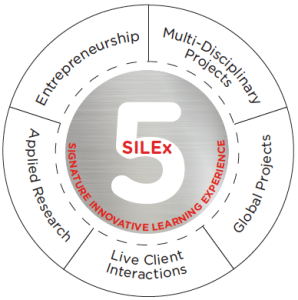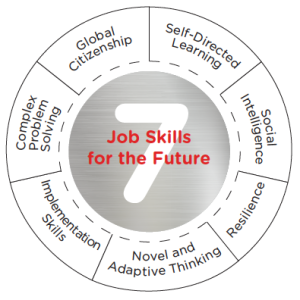5.1 SiLEX & Job Skills for the Future

SILEx
Each Fanshawe student engages in at least one meaningful experiential learning opportunity during their studies, underscoring the essential role hands-on learning plays in their educational experience.
Overall, there are five unique types of Signature Innovative Learning Experiences (SILEx).
Within the Personal Support Worker program curriculum, the SILEx is Live Client Interactions. Students interact with external partners and clients, to demonstrate application from the classroom to real-life settings. Live client interactions may be in the form of participating in a classroom setting with a standardized (simulated) client, for example, demonstrating caring for a resident who has had a stroke. Within both the classroom and clinical setting, feedback is provided from a faculty member and/or the Clinical Instructor.
Exercise: SILEx
Match the SILEx type to the correct definition.
Activity Description
Words:
- Global Projects
- Entrepreneurship
- Multi-disciplinary Projects
- Live Client Interactions
- Applied Research
Statements:
Demonstrate research skills through an applied research project with an external partner.
Demonstrate learning related to entrepreneurship, small business development/management or intrapreneurship
Work with a Canadian or international organization to address a global problem or opportunity.
Interact with external partners to demonstrate learning in a vocational area.
Collaborate with students from other programs to demonstrate learning in a vocational area.
Answers:
Applied Research: Demonstrate research skills through an applied research project with an external partner.
Entrepreneurship: Demonstrate learning related to entrepreneurship, small business development/management or intrapreneurship
Global Projects: Work with a Canadian or international organization to address a global problem or opportunity.
Live Client Interactions: Interact with external partners to demonstrate learning in a vocational area.
Multi-disciplinary Projects: Collaborate with students from other programs to demonstrate learning in a vocational area.
Words:
- Global Projects
- Entrepreneurship
- Multi-disciplinary Projects
- Live Client Interactions
- Applied Research
Statements:
Demonstrate research skills through an applied research project with an external partner.
Demonstrate learning related to entrepreneurship, small business development/management or intrapreneurship
Work with a Canadian or international organization to address a global problem or opportunity.
Interact with external partners to demonstrate learning in a vocational area.
Collaborate with students from other programs to demonstrate learning in a vocational area.
Answers:
Applied Research: Demonstrate research skills through an applied research project with an external partner.
Entrepreneurship: Demonstrate learning related to entrepreneurship, small business development/management or intrapreneurship
Global Projects: Work with a Canadian or international organization to address a global problem or opportunity.
Live Client Interactions: Interact with external partners to demonstrate learning in a vocational area.
Multi-disciplinary Projects: Collaborate with students from other programs to demonstrate learning in a vocational area.

Job Skills for the Future
Fanshawe College has identified 7 Job Skills for the Future that all programs in the college embed into their curriculum. These Job Skills are generic to all industries.
Competence in these job skills is regarded as required for those seeking to build successful careers. All of the 7 Job Skills for the Future are woven into different curricula at Fanshawe College. It is important that students can identify these skills in themselves and share how they have demonstrated competence in these skills when meeting with potential employers.
Exercise: Job Skills

Common job interview questions may go something like this:
- Tell me about a time when you had to learn something new. What was the situation, what did you do, and how did it turn out?
- Tell me about a time when you were working with someone as part of a team, and they were not doing their share of the work. What was the situation, what did you do, and how did it turn out?
- Tell me about a time when you had a complex problem to solve that meant you were going to have to miss a deadline. What was the situation, what did you do, and how did it turn out?
Every Fanshawe program emphasizes a minimum of three skills that are a priority for the success of its graduates.
Exercise
Match the Job Skills for the Future type to the correct definition.
Activity Description
Words:
- Novel and adaptive thinking
- Complex problem solving
- Self-directed learning
- Global citizenship
- Resilience
- Social intelligence
- Implementation Skills
Statements:
Find innovative, creative, and unconventional relationships between things or concepts.
Succeed through adversity.
Build and nurture mutually beneficial relationships.
Identify and achieve personal learning goals.
Create an awareness of the wider world and our place in it.
Find solutions to real-world problems.
Manage projects to achieve key milestones and outcomes.
Answers:
Novel and adaptive thinking: Find innovative, creative, and unconventional relationships between things or concepts.
Resilience: Succeed through adversity.
Social intelligence: Build and nurture mutually beneficial relationships.
Self-directed learning: Identify and achieve personal learning goals.
Global citizenship: Create an awareness of the wider world and our place in it.
Complex problem solving: Find solutions to real-world problems.
Implementation Skills: Manage projects to achieve key milestones and outcomes.
Words:
- Novel and adaptive thinking
- Complex problem solving
- Self-directed learning
- Global citizenship
- Resilience
- Social intelligence
- Implementation Skills
Statements:
Find innovative, creative, and unconventional relationships between things or concepts.
Succeed through adversity.
Build and nurture mutually beneficial relationships.
Identify and achieve personal learning goals.
Create an awareness of the wider world and our place in it.
Find solutions to real-world problems.
Manage projects to achieve key milestones and outcomes.
Answers:
Novel and adaptive thinking: Find innovative, creative, and unconventional relationships between things or concepts.
Resilience: Succeed through adversity.
Social intelligence: Build and nurture mutually beneficial relationships.
Self-directed learning: Identify and achieve personal learning goals.
Global citizenship: Create an awareness of the wider world and our place in it.
Complex problem solving: Find solutions to real-world problems.
Implementation Skills: Manage projects to achieve key milestones and outcomes.
To read more about each of the job skills for the future, please see Appendix A.
The Personal Support Worker (PSW) program integrates foundational theory with immersive, hands-on training to ensure graduates are fully prepared for the workforce. Through a blend of classroom instruction and real-world clinical placements, students acquire the practical skills and compassionate approach essential for delivering quality care as a PSW.
“The 7 Job Skills for the Future – Introduction” from Fanshawe SOAR by Kristen Cavanagh is licensed under a Creative Commons Attribution-NonCommercial-ShareAlike 4.0 International License, except where otherwise noted.
“Silex Job Skills For the Future” © Fanshawe College used with permission, All Rights Reserved

